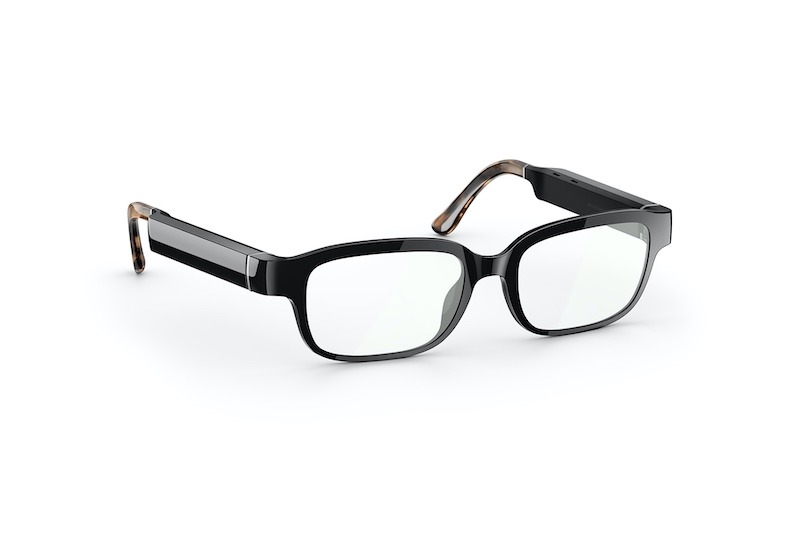
If they look like normal glasses and they wear like normal glasses, they must be normal glasses, right? In the case of Amazon’s recently unveiled Echo Frames, the answer is not so black and white. Although positioned by the shopping giant as the best way to take Alexa everywhere, there are plenty of skeptics. Designed to closely resemble a pair of regular glasses, Amazon is confident these are “day one” purchases for tech enthusiasts. That is a tall order and a lot remains to be seen, most important of which is how Amazon will handle privacy.
The Basics
As you may have already guessed, Amazon hopes the Echo Frames are the next step in placing Alexa everywhere in your life. The same functions that we know and love about Alexa are all present and accounted for. To make for even faster adoption, Amazon is ensuring that Echo Frames are compatible with most prescription lenses. Weighing around 31 grams, they are constructed from durable materials and can be adjusted by opticians.
To be perfectly clear, these are not augmented reality glasses and differ greatly from the much anticipated Google Glass. You won’t find any floating images, search results or YouTube videos playing. The Echo Frames are all about your voice. The battery and controls are on the right side, but everything is centered around voice activation. As with all Echo devices, just say “Alexa, what is the weather outside,” and you will receive an answer. Those answers derive from two speakers on both sides of the glasses.

As a beginning point on privacy, Amazon celebrates its “Open Ear” speaker technology. This functionality is said to ensure that only you can hear the results of an Alexa request, but without any real-world testing, it is impossible to know how realistic this is.
The Looks

Let us be completely honest. By all accounts, the Echo Frames are a sharp-looking pair of glasses. Yes, the additional thickness, especially on the “stems,” is noticeable but hardly unattractive. Unlike Google Glass which was instantly recognizable, the same likely cannot be said for Amazon’s entry into the glasses market. Early reviews have highlighted that they do not feel heavy for daily wear, but only long-term reviews will provide the best assessment of comfort over time.
Battery Life and Price
If you are going to wear the Echo Frames all day long, you can expect battery life to last as long as you do. Fortunately, Amazon is claiming you will receive around fourteen hours of battery life with intermittent use. Amazon states that is around 40 interactions with Alexa on a daily basis along with 45 minutes of music and/or podcast listening. That battery life also includes around 90 notifications on a daily basis as well. Overall, battery life is likely to vary depending on your use and will fluctuate each day. You can also customize notifications to eliminate some of the fluff and receive only what is important.

As for pricing, Amazon has already committed to a price tag of $179.99 in U.S. dollars. To get in on that price, you have to request an invitation on the Echo Frame product page and hope you are among the first to “win” an early purchase opportunity.
Privacy
At first glance, the Echo Frame feels a bit like the future and has the “cool” glow of new and shiny technology. Like all new tech toys, once you take a look behind the curtain, things get a bit murkier. That is especially true with this product. Perhaps the biggest make or break aspect of the Echo Frames’ success will be privacy. Yes, Amazon has already tried to head this off with its aforementioned “Open Ear” technology, but that is just half of it.

Amazon has already come under fire for recording conversations on your Echo and Fire devices without permission. How can we be sure that this will not be the case with this product? Unlike home-based Echo products, the Echo Frames will be on your person all day, every day and therefore subject to your most intimate personal conversations. That says nothing about the privacy concerns of sitting in a meeting at work where confidential and/or proprietary technology is being discussed. Nobody knows with certainty what is happening to these recorded conversations, so it is completely fair to raise the question of privacy.
Amazon has taken steps to enable Alexa users to control how their personal data is collected, saved and used. There is an option to not let Amazon collect or review any of your personal data. On top of that, you can also set your recordings to automatically delete after three- or 18-month periods. So that is a step in the right direction, but Echo Frame first-adopters are well within their rights to be skeptical.
Conclusion
In complete fairness, there is just something “cool” about the Echo Frames as a new avenue of voice-activated technology. However, there are a host of privacy concerns that could potentially put a black cloud on the coolness factor. Still, we cannot wait to see these up close and personal. Will privacy concerns stop you from looking at Amazon’s newest Echo product?








